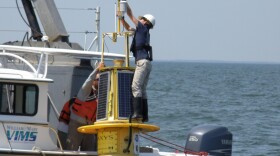It’s been nearly five years since an earthquake hit Virginia, toppling chimneys and brick walls, cracking foundations and toppling furniture. No one was killed or seriously injured, and for many people, it’s just an exciting memory, but for some the quake may have produced a silent but dangerous problem for homeowners.
Wolfgang Hermann runs a company called Central Virginia Radon -- testing for and getting rid of a radioactive gas that comes from rocks and soil - leaking into houses and putting their residents at increased risk for lung cancer. Shortly after the Mineral earthquake, he made a surprising discovery.
“I went to a customer who had a radon monitor at home, a plug in device where they could detect, yes, after the earthquake it went up twice as much.”
And he heard of other cases where the same thing happened.
“There are many other people who tell me, ‘We bought the house ten years ago, and there was nothing. We tested and there was nothing, and now we’re selling the home and we find there’s elevated radon.”

No studies have been done, but Ryan Paris, a radiation specialist for the state, doesn’t doubt that radon is a bigger problem since the magnitude 5.8 trembler hit.
“An earthquake could damage your foundation; open up new avenues for the gas to come in. It could possibly also further fracture the native rock that has the radon in it, and that could allow more radon to come up from that rock.”
Then again, he says, other factors could cause radon levels to rise.
“If you have a very powerful low pressure system moving through in addition to high winds, both of those things can actually de-pressurize a house a little bit, so those two things are both going to create a little bit of suction inside the house, and that can draw more radon in from underneath. If you have a lot of rainfall in the soil around your foundation, that can block radon gas that normally would have evacuated through the soil. It can then get redirected back into your foundation.”
He adds that some parts of this state are more likely than others to have radon problems.
“Almost exactly half of our counties are considered high risk. If you’re west of I-95 in Virginia, you’re going to be high or moderate risk, and if you’re east - especially in the areas close to the ocean or the bay, you’re going to be low risk. We suggest, especially if you’re close to that I-95 border or west of I-95, you should definitely test. You should think about testing even if you’re east of I-95 you should also think of testing, because we have seen high levels, even in low risk areas.”
In most cases, Wolfgang Hermann says the problem is easily fixed for about a thousand bucks by running a pipe from under the home’s foundation to a point above the house, where gases from the ground can be safely vented.
“Don’t be afraid. You do what you can do - you mitigate, and you have peace of mind.”
And while there’s no requirement that you test now, lenders or realtors may request a radon check before property can be sold.
Visit the Virginia Department of Health's site for more information.





